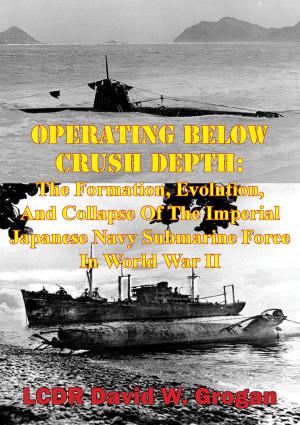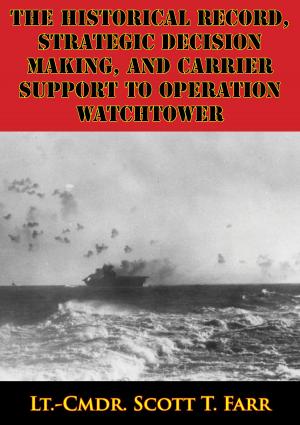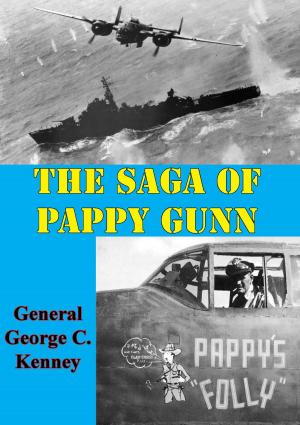Why Gallipoli Matters: Interpreting Different Lessons From History
Nonfiction, History, Military, World War I, Germany, British| Author: | Lieutenant Colonel John M. Sullivan Jr USMC | ISBN: | 9781782897033 |
| Publisher: | Verdun Press | Publication: | August 15, 2014 |
| Imprint: | Verdun Press | Language: | English |
| Author: | Lieutenant Colonel John M. Sullivan Jr USMC |
| ISBN: | 9781782897033 |
| Publisher: | Verdun Press |
| Publication: | August 15, 2014 |
| Imprint: | Verdun Press |
| Language: | English |
After careful study of the Gallipoli Campaign of 1915, why did the British and the Americans come up to contradictory operational conclusions regarding the future applicability of amphibious operations? Divergent views from the lessons of Gallipoli campaign are the result of three differing operational approaches to strategic considerations that Britain and the Unites States faced in the 1920s and 1930s. The first were different theater strategic objectives that required different operational campaigns necessary to achieve each. The second was different operational experiences, which caused one side to focus on the past while the other to the future. The final was the different means available to operational commanders to execute their campaign.
History can often provide contradictory lessons to those who wish to use it to practically apply operational art. Using analogies correctly is important. For the operational commander, drawing the correct lessons learned is made even more difficult by the very nature of inter-service rivalry. Derived from an analysis of the operational art and at operational level of war, the lessons learned from this campaign led directly to the development of sound doctrine, which developed in peacetime was absolutely essential in wartime. Finally, we continue to learn from failure more often than through success, but we must not allow ourselves to be intimidated by failure either.
After careful study of the Gallipoli Campaign of 1915, why did the British and the Americans come up to contradictory operational conclusions regarding the future applicability of amphibious operations? Divergent views from the lessons of Gallipoli campaign are the result of three differing operational approaches to strategic considerations that Britain and the Unites States faced in the 1920s and 1930s. The first were different theater strategic objectives that required different operational campaigns necessary to achieve each. The second was different operational experiences, which caused one side to focus on the past while the other to the future. The final was the different means available to operational commanders to execute their campaign.
History can often provide contradictory lessons to those who wish to use it to practically apply operational art. Using analogies correctly is important. For the operational commander, drawing the correct lessons learned is made even more difficult by the very nature of inter-service rivalry. Derived from an analysis of the operational art and at operational level of war, the lessons learned from this campaign led directly to the development of sound doctrine, which developed in peacetime was absolutely essential in wartime. Finally, we continue to learn from failure more often than through success, but we must not allow ourselves to be intimidated by failure either.

![Cover of the book Lost Victories: The War Memoirs of Hitler's Most Brilliant General [Illustrated Edition] by Lieutenant Colonel John M. Sullivan Jr USMC](https://www.kuoky.com/images/2015/november/300x300/9781786257758-yHGy_300x.jpg)

![Cover of the book From Gallipoli To Baghdad [Illustrated Edition] by Lieutenant Colonel John M. Sullivan Jr USMC](https://www.kuoky.com/images/2014/august/300x300/9781782895541-9iCj_300x.jpg)





![Cover of the book A War of Their Own: Bombers Over the Southwest Pacific [Illustrated Edition] by Lieutenant Colonel John M. Sullivan Jr USMC](https://www.kuoky.com/images/2014/august/300x300/9781782899266-HdAC_300x.jpg)



![Cover of the book NEW ZEALAND DIVISION 1916-1919. The New Zealanders In France [Illustrated Edition] by Lieutenant Colonel John M. Sullivan Jr USMC](https://www.kuoky.com/images/2014/june/300x300/9781782892427-VkWo_300x.jpg)
![Cover of the book NEW ZEALANDERS AT GALLIPOLI [Illustrated Edition] by Lieutenant Colonel John M. Sullivan Jr USMC](https://www.kuoky.com/images/2014/june/300x300/9781782892458-jd5I_300x.jpg)
![Cover of the book Why, How, Fleet Salvage And Final Appraisal [Illustrated Edition] by Lieutenant Colonel John M. Sullivan Jr USMC](https://www.kuoky.com/images/2014/august/300x300/9781782894452-7NSe_300x.jpg)